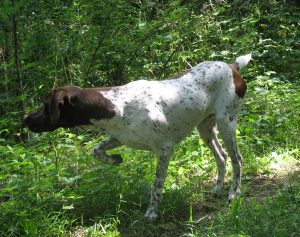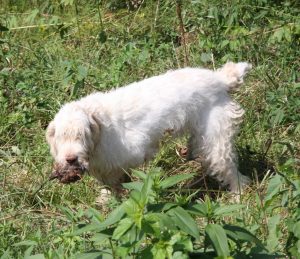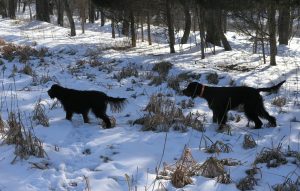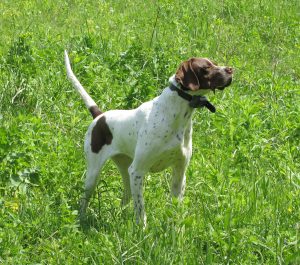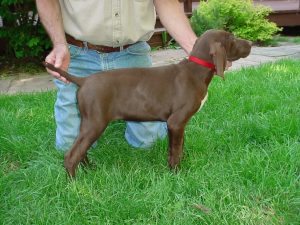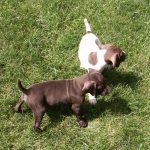POINTING DOG POINTERS: Pointing Dog Breeds — Which One Is for You?
By Bob and Jody Iler
If you’re new to the world of pointing dogs, you might feel a bit overwhelmed wondering which breed would be best for you!
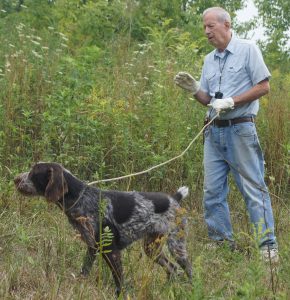
The German wirehair pointer has a short, wiry coat and undercoat suitable for cold weather and water
Some of the breeds you might be familiar with are German shorthaired pointers, German wirehaired pointers, wirehaired pointing griffons, English pointers, pudelpointers…Drahthaars, vizslas, Brittanys, Weimaraners…English, Irish, Gordon, and red Setters…large and small Munsterlanders…spinones, bracco Italianos…and much more!
Looks, of course, are just the tip of the iceberg. You may have a friend or acquaintance with a pointing dog of a breed that interests you. You may have seen a picture of a dog that really captured your attention. Often, we just get a gut feeling for what type of pointing dog we might prefer.
More importantly, you may have seen several different pointing dog breeds at work in the field and noticed similarities or differences between them that speak to you and what you’re looking for in a hunting companion.
To sift things through, you’ll need to ask yourself two sets of questions: 1) How would you describe yourself as an owner/hunter? and 2) What are you looking for in a pointing dog?
Describe Yourself
- What kind of birds do you like to hunt and in what type of cover?
- What climate do you live in and will you hunt in? Cold, hot, in-between?
- What kind of physical condition are you in? Are you young and athletic or older and moving a “bit slower?”
- Will your dog be a house companion or an outside kennel dog?
- Can you spend plenty of time training, hunting, exercising, and grooming your dog?
- Do you prefer a large or small breed? Long hair or short? Long or short tail? Dark or light color?
- Will your ideal dog have a lot of drive and “go” in the field? Or would you prefer a more methodical, laid-back partner?
- Do you want a dog that works closely, or ranges farther out?
- How much money do you want to spend to purchase your pointing dog?
- Are you looking for a top-notch pedigree, or do you simply want a good pup from hunting parents?
Your answers to these questions will help you to make the best choice about the pointing dog that will be right for you.
And to do that, you’ll want to research the breeds that interest you. Talk to as many breeders as possible about their dogs and whether they will fit the bill for you, or you for them. Visit field events and ask the participants about their dogs. Watch how the dogs work in the field. Read as much material (in books or online) as you can find about your preferred breeds.
Your practical and personal considerations will be your dog’s size, color, length of coat and tail, and whether he’ll be an indoor or outdoor dog. Outdoor dogs in a cold climate – in addition to needing a warm, insulated and dry house – will fare better with a thick undercoat to help them stay warm. Likewise, dogs with less coat will do best in warm climates. You might want a smaller breed like a Brittany for a house dog, if size is a concern. If you don’t like to spend a lot of time on grooming, you may prefer a short-haired dog that requires less attention to coat. A dog that’s predominately white is flashy and seen easily in the field, except in snow – but color is often just a matter of preference.
More important are the characteristics of the different breeds. All of them were bred to be hunters and should point, have a good nose, and demonstrate prey drive. Your future pup’s pedigree contains a wealth of information, including whether pup comes from a long line of field champions and whether his close relatives have been certified free of genetic defects such as hip disease, etc.
Large gene pools of various breeds can be a factor to consider. If the breed is very popular with a large genetic pool, this can reflect occasional poor breeding choices by individuals who don’t have the breed’s best interests in mind. The result can be some lines within the breed that are not “typey” and that may produce dogs with less than stellar temperaments, conformation, and abilities.
Different bloodlines within different breeds can also cultivate dominant traits – like natural retrieving, lots of range, and great drive. There will also be lines that produce closer-working dogs, which may be just what you’re looking for. Keep in mind that within all the pointing dog breeds, there will be soft, biddable pups, headstrong outlaws, and those in-between. There’ll be ones that will want nothing more than to be by your side when not in the field, and ones that will fare well as kennel dogs as long as they have plenty of love, exercise, and attention.
Just as you evaluated yourself and what type of pointing dog would best suit you, once you’ve decided on a breed, here are some questions to consider when choosing a pup.
Describe Your Ideal Pup
- Does pup have a good nose and pointing instinct?
- Is pup bold and inquisitive, or is pup somewhat timid?
- Does pup seem easy-going and laid back, or full of “fire” and ready to explore?
- Does pup’s health history and that of the parents check out satisfactorily?
- Have you observed pup’s parents in the field?
- Is the pup “well put-together” and “sound?”
- Does the pedigree reflect time and effort spent in earning field titles and good health certifications for the pup’s ancestors?
- Does the pup have retrieving ability? How important is this to you?
You probably won’t be able to determine all these qualities in very young pups. That’s why you’ll want to rely heavily on proven, quality breeders as well as the folks who’ve had dogs from these breeders. These people can tell you what the dogs will likely grow up to be, what dominant characteristics they will have, and how true to type they are. A good breeder knows his litter and can often help choose the best pup for you. If the pup you’re interested in is a little older, you can ask the breeder or trainer to give you a short field demonstration.
So, let’s recap.
Make an honest appraisal of yourself – your health, abilities, preferred habitat to hunt, preferred game birds, and personal preferences in your choice of a pointing dog breed. Then, winnow carefully through the pointing dog breeds that appeal to you, and narrow your choices to those bloodlines with the dominant characteristics desired. If possible, have an experienced person help you in your search and remember that the only “stupid” question is the one you don’t ask.
With knowledge, persistence, and patience – you’ll find the right pointing dog for you!
Pointing Dog Pointers features monthly training tips by Bob and Jody Iler, who own Green Valley Kennels in Dubuque, Iowa. Bob and Jody have trained pointing dogs for over 35 years and have written many articles for Pointing Dog Journal.



